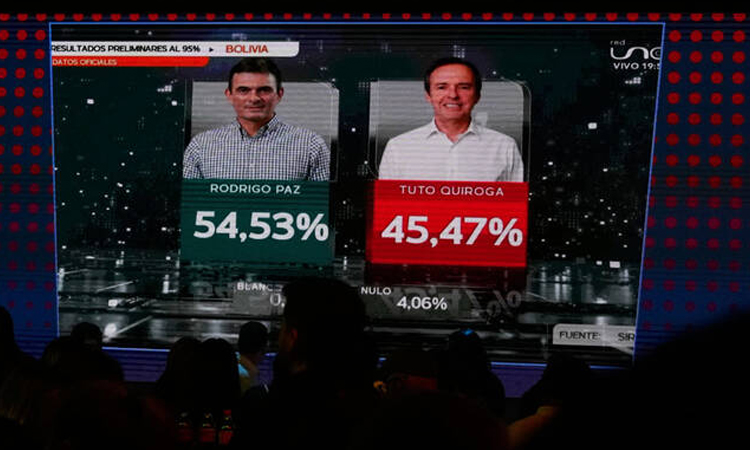News Flash
News Flash

LA PAZ, Oct 20, 2025 (BSS/AFP) - Bolivians on Sunday elected a pro-business center-right senator as their new president, ending two decades of socialist rule that have left the South American nation deep in economic crisis.
With 97.8 percent of ballots counted, Rodrigo Paz had 54.6 percent of the vote to 45.4 percent for his rival, right-wing former interim president Jorge "Tuto" Quiroga, the Supreme Electoral Tribunal (TSE) said.
The news was greeted with joy, music and fireworks on the streets of La Paz.
"We came to celebrate the victory with great hope of a new direction for Bolivia," reveler Julio Andrey, a 40-year-old lawyer, told AFP.
Paz, the 58-year-old son of a former president, has vowed a "capitalism for all" approach to economic reform, with decentralization, lower taxes and fiscal discipline mixed with continued social spending.
He takes over a country that under ex-president Evo Morales took a sharp turn to the left: nationalizing energy resources, breaking ties with Washington and making alliances with China, Russia and fellow leftists in Cuba, Venezuela and elsewhere in Latin America.
After the results were announced, Paz's vice-presidential running mate, Edmand Lara, made a call for "unity and reconciliation" after a bitter campaign.
While Bolivia is enduring its worst economic crisis in decades, he promised improvements are on the horizon.
"We must ensure the supply of diesel and gasoline. People are suffering. We need to stabilize the prices of the basic food basket, and we must put an end to corruption," he said.
Long queues for fuel have become a way of life in Bolivia, with dollars in short supply and annual inflation over 20 percent.
In a first electoral round in August, crisis-weary voters snubbed the Movement Toward Socialism party founded by Morales.
- 'A lot of suffering' -
Sunday's election closes out an economic experiment marked by initial prosperity funded by Morales's nationalization of natural gas reserves.
The boom was followed by bust, notably critical shortages of fuel and foreign currency under outgoing leader Luis Arce.
"We hope the country improves," homemaker Maria Eugenia Penaranda, 56, told AFP Sunday, bundled up against the cold as she cast her vote in La Paz, about 3,600 meters (11,800 feet) above sea level.
"We cannot make ends meet. There is a lot of suffering. Too much," she told AFP.
Successive governments under-invested in the country's hydrocarbons sector, once the backbone of the economy.
Production plummeted and Bolivia almost depleted its dollar reserves to sustain a universal subsidy for fuel that it can no longer afford to import.
- Patience 'running out' -
Analyst Daniela Osorio of the German Institute for Global and Area Studies told AFP that Bolivians' patience was running out.
Once the election is over, she warned, "if the winner does not take measures to help the most vulnerable, this could lead to a social uprising."
Paz faces an uphill task, inheriting an economy in recession, according to the World Bank.
He had promised to maintain social programs while stabilizing the economy, but economists have said the two things are not possible at the same time.
"He has maintained a very calm, centrist tone... he has connected with people who want change, but not radical change," political scientist Gabriela Keseberg told AFP of Paz's victory.
- 'Difficult to heal' -
Paz vowed before the results came out Sunday that his governance style will be one of "consensus."
He will not have a party majority in Congress, meaning he will need to make concessions to get laws passed.
Outside of Congress, the new president will also face stiff opposition from Morales, who remains popular -- especially among Indigenous Bolivians -- but was constitutionally barred from seeking another term.
Quiroga on Sunday said his team would review the official results but congratulated Paz on his victory nevertheless.